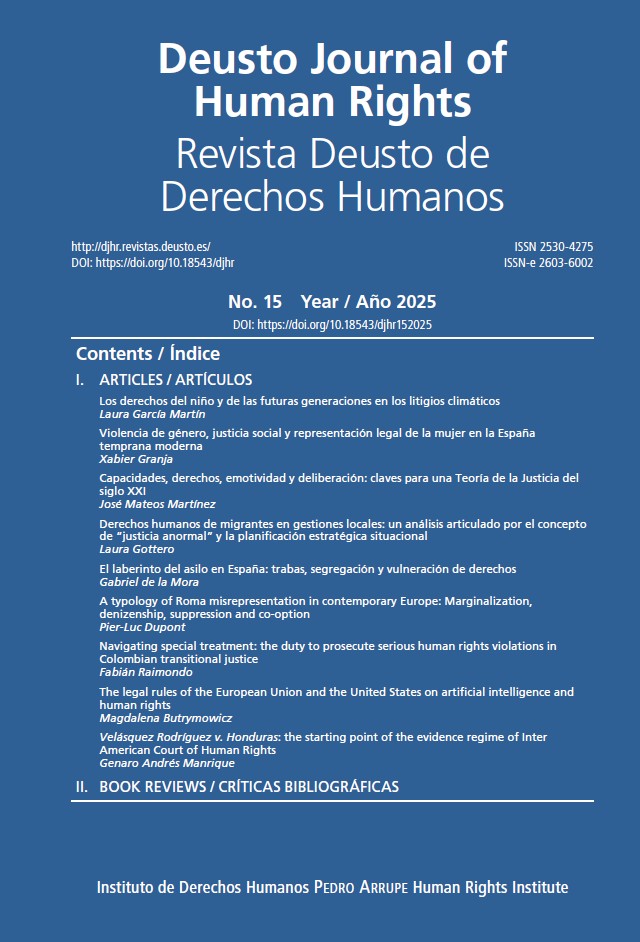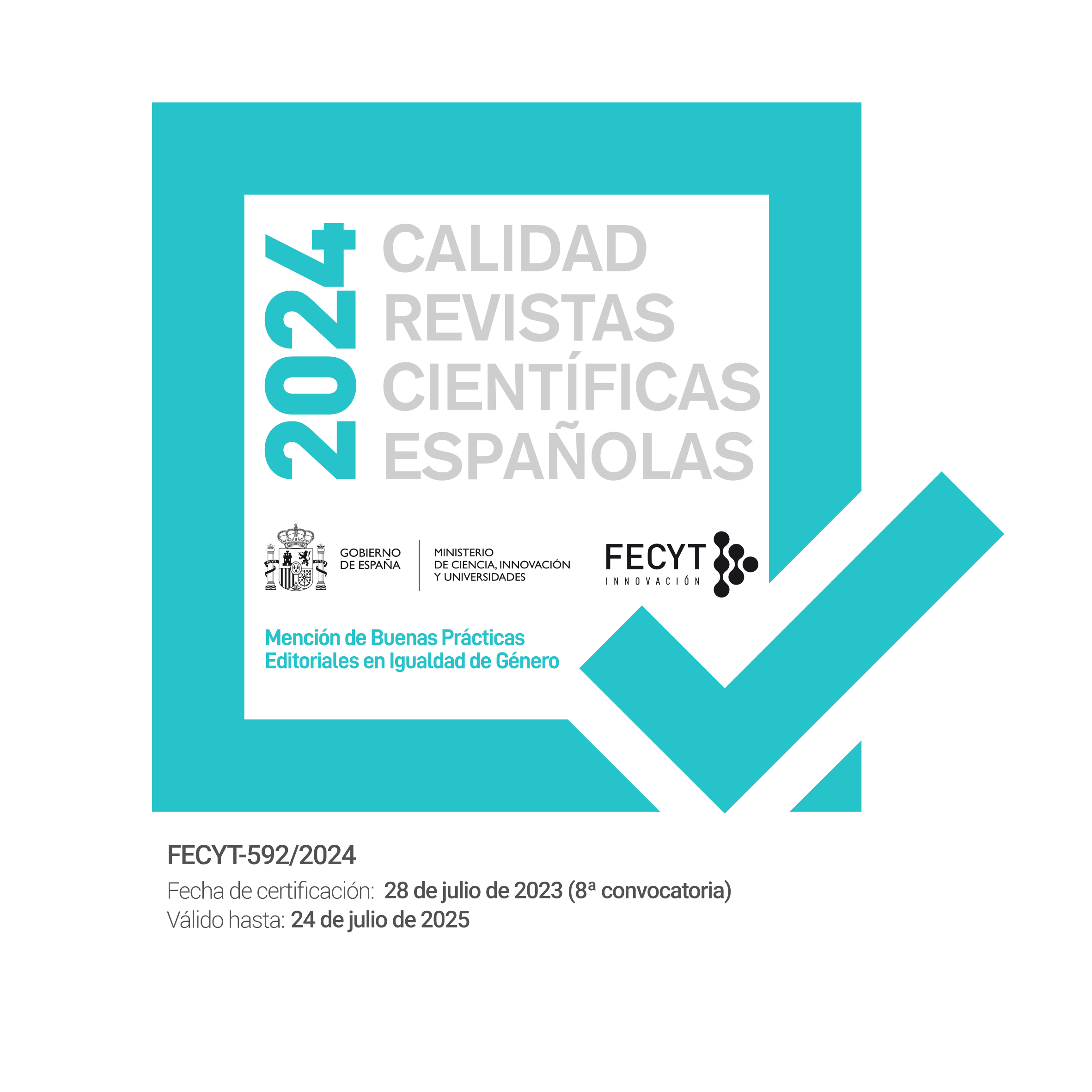Las normas jurídicas de la Unión Europea y Estados Unidos sobre inteligencia artificial y derechos humanos
Resumen
En la era contemporánea, la inteligencia artificial se ha convertido en un componente integral de nuestra vida cotidiana, impregnando diversas facetas del funcionamiento de la sociedad con una prevalencia cada vez mayor. Dada su omnipresencia en nuestras vidas, es inevitable que la IA ejerza una influencia sobre nosotros, lo que plantea la cuestión de si existe un nexo entre la IA y los derechos humanos. Es importante señalar que un algoritmo creado por una máquina de IA carece de sentimientos, emociones o prejuicios. Esto puede ser indicativo de una limitación fundamental de la inteligencia artificial como herramienta en sí misma, constreñida por las capacidades y posibilidades de la tecnología y, por tanto, incapaz de percibir y analizar a la manera de la mente humana. Es imperativo que la inteligencia artificial esté diseñada para ser completamente imparcial y analizar únicamente los datos que se le confían para su procesamiento. Además, debe ser capaz de aprender de sus errores y estar libre de las emociones asociadas a las relaciones humanas. Por el contrario, es tan imperfecta como el ser humano que está detrás de su creación. En la era contemporánea, varias naciones se esfuerzan por someter el ámbito de la inteligencia artificial a las disposiciones de un marco jurídico. Existen tres grandes modelos de regulación de la IA: el primero se basa en normativas del sector jurídico; el segundo, en directrices de organizaciones interadministrativas; y el tercero, en soluciones jurídicas sobre otras cuestiones similares. Estados Unidos y la Unión Europea han estado a la vanguardia de la regulación de la IA, adoptando cada uno diferentes variantes. La presente publicación se propone comparar la legislación de la UE y de EE. UU. en el contexto de la matriz que sirvió para crearla, y determinar si regula los derechos humanos. Para ello, se toma como caso de prueba la cuestión de los derechos de las minorías étnicas.
Recibido: 16 marzo 2025
Aceptado: 07 junio 2025
Descargas
Citas
Andersx, Oskal, Johan Mathis Turi, and Svein D. Mathiesen. 2009. Reindeer herding, traditional knowledge and adaptationto Climate Change And Loss Of Grazing Land. Alta: Arctic Council.
Ashwini, K.P. 2024a. Bias from the past leads to bias in the future. Accessed june 16, 2025: https://www.ohchr.org/en/stories/2024/07/racism-and-ai-bias-past-leads-bias-future (accessed February 23, 2025).
Ashwini, K.P. 2024b. United Nation Human Rights Council. July 30. Accessed June 16, 2025. https://www.ohchr.org/en/stories/2024/07/racism-and-ai-bias-past-leads-bias-future.
Blaine, Tristan. 2025. «Guide to AI Laws and Regulations in the U.S.» LawSoup. Accessed February 6, 2025. https://lawsoup.org/legal-guides/ai-laws-in-the-us-artificial-intelligence-regulations.
Buolamwini, Joy. 2022. How I’m fighting bias in algorithms. Accessed May 15, 2022: https://www.ted.com/talks/joy_buolamwini_how_i_m_fighting_bias_in_algorithms?language=en.
Council of Europe. 2025. «Human Rights and artificial intelligence.» Human Rights Intergovernmental Cooperation. Accessed January 1, 2025: https://www.coe.int/en/web/human-rights-intergovernmental-cooperation/intelligence-artificielle.
Council of Europe, CDDH-IA. 2025. Human Rights and artificial intelligence. Accessed January 15, 2025: https://www.coe.int/en/web.
Council of Europe/European Court of Human Rights. 2021. Guide on Article 14 of the European Convention on Human Rights and on Article 1 of Protocol No. 12 to the Convention. Strasbourg: Council of Europe.
Cowger, Alfred R. 2020. The Threats of Algorithms and AI to Civil Rights, Legal Remedies, and American Jurisprudence: One Nation Under Algorithms. Lanham: Rowman & Littlefield.
European Comission. 2021. Shaping Europe’s digital future - AI Pact. Accessed December 20, 2024: https://digital-strategy.ec.europa.eu/en/policies/ai-pact.
European Comission. 2020. On Artificial Intelligence - A European approach to excellence and trust. White paper, Brussels: European Comission.
European Comission. 2019. «Shaping Europe’s digital future.» Ethics guidelines for trustworthy AI. April 8. Accessed February 20, 2025: https://digital-strategy.ec.europa.eu/en/library/ethics-guidelines-trustworthy-ai.
European Union. 2024a. «Regulation 2024/1689 laying down harmonised rules on artificial intelligence.» Artificial Intelligence Act. Brussel: Official Journal of the European Union. Accessed June 13, 2024: https://www.coe.int/en/web/artificial-intelligence/the-framework-convention-on-artificial-intelligence.
European Union High-Level Expert on Artificial Intelligence. 2019. A definition of AI: Main capabilities and scientific disciplines. Brussels. Accessed June 14, 2025: file:///C:/Users/VT97/Downloads/ai_hleg_ai_definition_final_ DF06F793-EA01-3573-16D2ACD625E2BDB0_56341.pdf.
European Union. 2016. «Regulation (EU) 2016/679 of the European Parliament and of the Council of 27 April 2016 on the protection of natural persons with regard to the processing of personal data and on the free movement of such data, and repealing Directive 95/46/EC.» Official Journal of the European Union. Accessed December 20, 2024: https://eur-lex.europa.eu/eli/reg/2016/679/oj/eng.
Eurydice. 2021. Norway, Population: demographic situation, languages and religions. Accessed May 21, 2022: https://national-policies.eacea.ec.europa.eu/youthwiki/chapters/norway/overview.
IBM. 2025. Everyday Ethics for Artificial Intelligence. Accessed May 15, 2025: https://www.ibm.com/artificial-intelligence/ai-ethics.
Microsoft. 2025a. Responsible AI resources. Accessed May 15, 2025: https:// www.microsoft.com/en-us/ai/responsible-ai-resources.
Microsoft. 2025b. Guideline 5 Match relevant social norms. Accessed May 15, 2025: https://www.microsoft.com/en-us/haxtoolkit/guideline/match-relevant-social-norms.
Microsoft. 2025c. Guideline 6, Mitigate social biases. Accessed may 15, 2025: https://www.microsoft.com/en-us/haxtoolkit/guideline/mitigate-social-biases/.
OECD. 2023. «AI Policy Observatory.» Accessed May 15, 2022: https://oecd.ai/en/dashboards/ai-principles/P6.
Samsung. 2025. AI Ethics. Accessed May 15, 2025: https://www.samsung.com/latin_en/sustainability/digital-responsibility/ai-ethics/.
Smith, Karen and Anna Hill. 2019. Defining the Nature of Blended Learning through Its Depiction in Current Research. Milton Park: Higher Education Research & Development.
The Council of Europe. 2024. Council of Europe Framework Convention on Artificial Intelligence and Human Rights, Democracy and the Rule of Law. Vilnus. Accessed September 5, 2024: https://www.coe.int/en/web/artificial-intelligence/the-framework-convention-on-artificial-intelligence
The European Commission. 2018. Artificial Intelligence for Europe. Accessed March 27, 2025: https://eur-lex.europa.eu/legal-content/EN/TXT/?uri=COM%3A2018%3A237%3AFIN.
The European Digital Rights Association. 2025. EDRI. 2025. Accessed May 15, 2025: https://edri.org/.
The European Parliament and of the Council. 2022. «Regulation 2022/1925 on contestable and fair markets in the digital sector.» Digital Markets Act. Brussel: EUR-Lex, September 14.
The European Parliament and of the Council. 2022. «Regulation 2022/2065 of the of on a Single Market for Digital Services.» Single Market for Digital Services. Official Journal of the European Union, October 19.
U.S. White House. 2023. White House Blueprint for an AI Bill of Rights. Accessed February 14, 2025: https://bidenwhitehouse.archives.gov/ostp/ai-bill-of-rights/.
U.S. Departament of State, Bureau of Cyberspace and Digital Policy. 2024. «Risk Management Profile for Artificial Intelligence and Human Rights.» July 25. Accessed December 20, 2024: https://2021-2025.state.gov/risk-management-profile-for-ai-and-human-rights.
United Nation. 2025. Ms. Ashwini K.P. Special Rapporteur on contemporary forms of racism. Accessed June 12, 2025: https://www.ohchr.org/en/special-procedures/sr-racism/ms-ashwini-kp.
United Nation, Department of Economic and Social Affairs. 2018. The Report on the World Social Situation 2018, Promoting Inclusion Through Social Protection. https://doi.org/10.18356/5ef37a49-en.
United States House of Representatives. 2020. H.R.6216 - National Artificial Intelligence Initiative Act of 2020. Washington: Congress, March 12.
Yeung, Karen. 2019. A study of the implications of advanced digital technologies (including AI systems) for the concept of responsibility within a human rights framework. Council of Europe study DGI(2019)05. Council of Europe.
Zhu, Liming , Xiwei Xu, Guido Governatori, and Jo Whittle. 2021. «AI and Ethics-Operationalizing Responsible AI.» In Humanity Driven AI, edited by Jianlong Zhou and Fang Chen, 15-16. New York: Springer International Publishing.
Derechos de autor 2025 Universidad de Deusto

Esta obra está bajo licencia internacional Creative Commons Reconocimiento-NoComercial 4.0.
Deusto Journal of Human Rights / Revista Deusto de Derechos Humanos es una revista de Acceso Abierto; lo que significa que es de libre acceso en su integridad inmediatamente después de la publicación de cada número. Se permite su lectura, la búsqueda, descarga, distribución y reutilización en cualquier tipo de soporte sólo para fines no comerciales y según lo previsto por la ley; sin la previa autorización de la Editorial (Universidad de Deusto) o la persona autora, siempre que la obra original sea debidamente citada (número, año, páginas y DOI si procede) y cualquier cambio en el original esté claramente indicado. Cualquier otro uso de su contenido en cualquier medio o formato, ahora conocido o desarrollado en el futuro, requiere el permiso previo por escrito de la persona titular de los derechos de autoría.



3.jpg)
3.jpg)
3.jpg)
.jpg)








